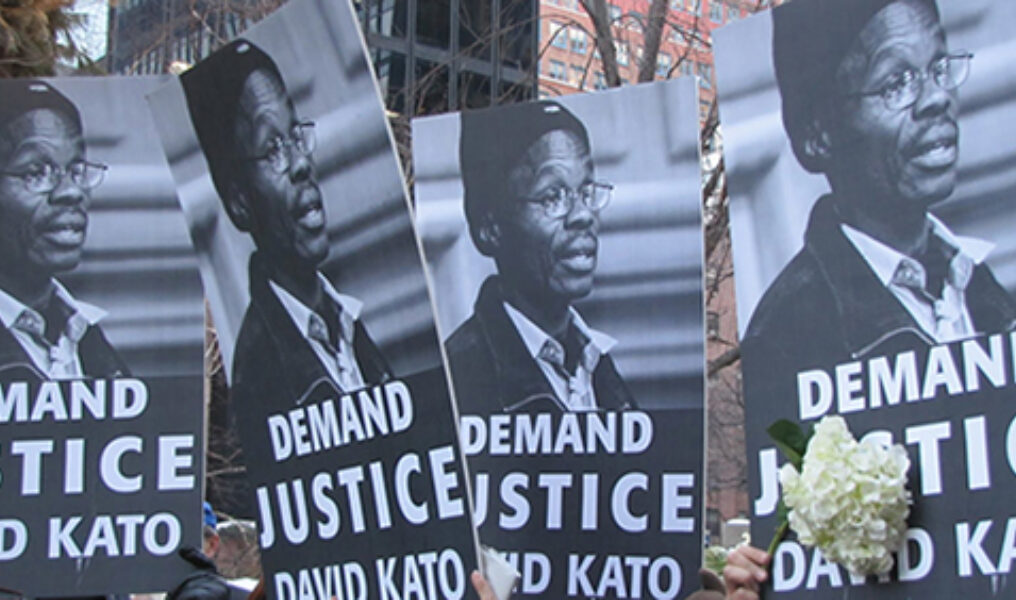
A 2011 vigil in NYC – one of many held worldwide – after Ugandan LGBT activist David Kato was murdered. Violence has escalated in many African countries. Thirty eight of them criminalize homosexuality. Last week Ugandan Frank Mughisa visited Detroit to educate people about the situation for LGBT people in his country.
DETROIT РÒBy tomorrow homosexuality becomes expandably criminalized in Uganda.Ó Frank Mugisha, Ugandan LGBT rights activist was not being dramatic when he made this statement during a panel discussion on LGBT rights at the Charles H. Wright Museum of African American History Feb. 20. By Feb. 24, Uganda's President Museveni signed the controversial anti-gay bill into law. Homosexual acts were already illegal in Uganda. The new law toughens penalties against gay people and defines some homosexual acts as crimes now punishable by life in prison.
"The United State is deeply disappointed in the enactment of the Anti-Homosexuality Bill in Uganda," read a statement from the U.S. State Department. "As President Obama stated, this legislation is not just morally wrong, it complicates a valued relationship. Now that this law has been enacted, we are beginning an internal review of our relationship with the Government of Uganda to ensure that all dimensions of our engagement, including assistance programs, uphold our anti-discrimination policies and principles and reflect our values."
Mugisha, who is also executive director of Sexual Minorities Uganda (SMUG), and recipient of the Robert F. Kennedy Human Rights Award (2011), was in Detroit for a program that included a screening of √íCall Me Kuchu,√ì a film that profiles four openly LGBT individuals in Uganda — among them, the late David Kato. The program was a collaborative effort of Amnesty International, Freedom House the Stonewall Bar Association of Michigan and KICK-the Agency for LGBT African Americans.
A bill introduced in the Ugandan Parliament in 2009 initially proposed a death sentence for homosexual acts but was amended to prescribe jail terms including life in jail for what it called aggravated homosexuality. It includes gay sex with a minor, where the victim is infected with HIV and where the victim is vulnerable, such as a disabled person.
The legislation was passed by Parliament in December 2013 and sent to Ugandan President Yoweri Museveni in January.
The documentary ÒCall Me KuchuÓ depicts the last year in the life of David Kato, the Ugandan LGBT activist who worked tirelessly to repeal homophobic laws and liberate the countryÕs LGBT community known as KuchuÕs. The film is dedicated to Kato and has inspired a new generation of LGBTQ/human rights.
Homosexuality is taboo in most African countries and illegal in 38. Few Africans are openly gay, as they fear imprisonment, violence and loss of their jobs. Members of Ugandans LGBT community were hounded relentlessly and publicly outed by a Kampala tabloid publication. The publicationÕs persecution of gays and lesbians within the community was encouraged by religious conservatives including evangelists from the United States, most notably Scott Lively.
Prior to the screening Feb. 20 Mugisha sat down with members of the LGBT community and the press to talk about being gay in Uganda and what he hoped to accomplish by his current visit to the United States.
According to Mugisha religion is, ÒSomething you donÕt want to cross. You do not question a pastor because they say they are speaking from God. You cannot speak from a religious point of view to people.Ó
Much like activists in the United States have found, the key to touching hearts and minds works best when people get to know individuals. ÒWe approach them as ordinary Ugandans,Ó Mugisha said. ÒWe just speak as ordinary people. I am Catholic, born and raised. I still go to church because I know God loves me. Being gay is only a tiny percent of my life,Ó he added. ÒThe rest of me is human.Ó
Politicians and diplomats have called for sanctions and threats of cutting financial aid, but according to Mugisha there are other ways to apply leverage to Uganda and world politics on LGBT rights.
ÒLaws do not change how people feel and treat us. Homophobia must change among people without laws,Ó Mugisha said. ÒWe must have more opportunities to dialogue with people.Ó
According to Mugisha, LGBT supporters need to ask governments in every country what are they doing and demanding more; be informed about international attacks on LGBT and human rights; do more than cutting funds, investing funds in countries that promote equality; and encourage more progressive African countries to take the lead in reforms.
For Mugisha the work goes on. Sexual Minorities Uganda (SMUG) has already shut down the tabloid that outed individuals for persecution thousands of LGBT Ugandans. A lawsuit against Evangelist Pastor Scott Lively is in the works. After he finishes his visit to the United States, heÕs going back to Uganda even in the shadow of repressive, homophobic legislation with 55 human rights organizations and hundreds of volunteers, he will continue to fight for the rights of the LGBT community.











